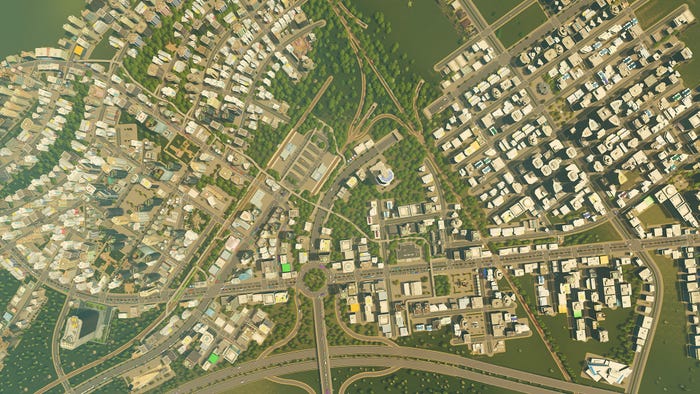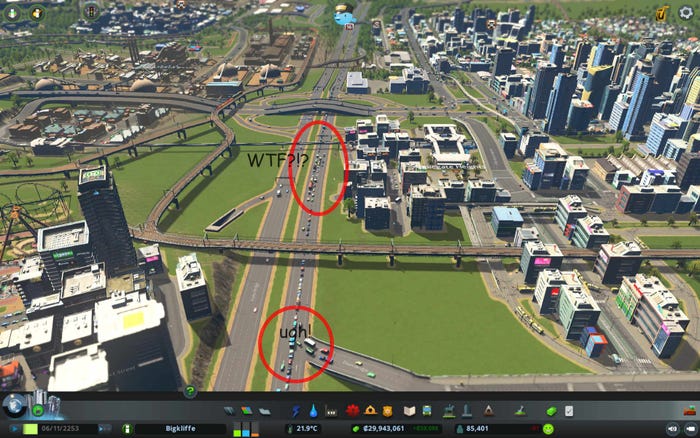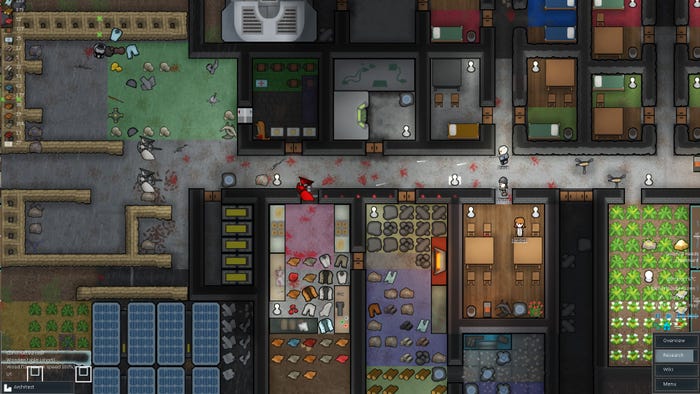Trending
Opinion: How will Project 2025 impact game developers?
The Heritage Foundation's manifesto for the possible next administration could do great harm to many, including large portions of the game development community.
There is no need to implement mechanics and parameters that are not capable of creating interesting situations even theoretically.

I play a lot of Cities: Skylines and at one point caught me thinking that the most interesting part of this game... is not actually building the city.

Building the city has become routine for me due to its simplicity. I lay out a grid of roads for a new district, assign residential, commercial, and industrial zones in the perfect proportions (if anything needs adjusting, it can be done later), place a police station, school, fire station, and hospital on the main road, lay down utilities, and that's it. There's no challenge or excitement to it, as everything is built in a similar way each time. The decision of where exactly to place the police station within the district doesn't have much impact, and the game conveniently suggests the ideal spot for cops to quickly respond to calls.
Because the solution found once always works, it becomes routine.
So, the most captivating aspect of this game for me is the handling of traffic problems.

Despite the simplicity of road construction, finding the best road junction schemes is not easy. Honestly, I had to peek at the Steam Workshop to understand which types of interchanges are most efficient. Even when you build them, sometimes there are issues at their outer points, which turns finding a good solution between three districts into a complex task. This is where the phrase "easy to learn, but hard to master" comes to life. Because I never achieved mastery in this, it interests me.
This prompted me to think that other tycoons, despite complex AI and intricate systems of needs with numerous variables, create something like a window view simulator. In this window view, despite the enormous complexity and profound complexity of each individual's needs, what we are most likely to see is bustling passersby and cars passing by evenly. Even half an hour of continuous observation is unlikely to give us any surprises, like a robbery, chase, naked person, fight, or precipitation in the form of meatballs.
That's why the gaming industry has gone through a period of experimentation with simulations in AA and AAA games, such as A-Life in Stalker. Nowadays, most rely on scripts to create memorable events. This is because the implementation of such systems has led to mediocre results, just like the repeated attempts at level generation (most recent, Starfield). What in optimistic theory leads to a lot of unique planets, in practice results in faceless ones that are eerily similar to each other.
However, unlike linear first-person shooters, tycoon games are costly to build solely on scripts, which hinders the important aspect of replayability for the genre. Therefore, simulations and complex needs systems are implemented, but they are executed mediocrely.
In most tycoon games, constructions have minimal impact on each other, and gameplay revolves around managing a multitude of parameters. For example, constructing a police station in a district might only reduce crime by a mere 15%. While these games are filled with various parameters, their significance is often downplayed. Players usually notice a decrease in one parameter and simply rectify it by adding a new building to their empire.
The gameplay of such tycoons largely involves a steady and gradual increase of all existing parameters by constructing new structures. Eventually, players craft something close to perfection, and that's when the game experience starts to dwindle. This linear progression holds no surprises and does not provide a novel gameplay experience. In the end, the player is captivated by the expansion of their city, but not by the process of building it.
But not all is lost, and a solution to the problem has been found. The name of this game is Dwarf Fortress, however, it is too graphically primitive and difficult to learn. Therefore, I would recommend its more user-friendly successor - Rimworld.
 RimWorld has sold over three million copies and garnered 98% positive reviews on Steam. This makes this game one of the most popular in the management/tycoon genre. It is not new (released in 2018, after being in Early Access). Its author, Tynan Sylvester, even wrote a book. Its main ideas are as follows:
RimWorld has sold over three million copies and garnered 98% positive reviews on Steam. This makes this game one of the most popular in the management/tycoon genre. It is not new (released in 2018, after being in Early Access). Its author, Tynan Sylvester, even wrote a book. Its main ideas are as follows:
focus on engineering experiences rather than just creating games
harness the power of games to evoke emotions and create immersive experiences
challenge players to think strategically
focus on unique parameters specific to their game genre, rather than relying on common ones found in countless other games.
And practice has shown that it works. Here are a couple of eloquent reviews for the Rimworld on Steam:



If you haven't played this game, I recommend playing it yourself. And if you enjoy it, you can even give Dwarf Fortress a try :-)
Describing the issue and using Dwarf Fortress and Rimworld as examples, I will now outline my own conclusions:
There is no need to implement mechanics and parameters that are not capable of creating interesting situations even theoretically. If there is a need to eat and drink only leads to the NPC having to go to a certain place every x minutes and play an animation there, and you have no plans for additional mechanics to create interesting situations out of it, is this need necessary at all?
If you create a parameter system where an average player at a medium difficulty level never reaches extreme parameter values, this system will not provide you with interesting situations. Look at the stock market, see how smart and self-confident people endured crashes, how newcomers managed to catch luck by the tail, how experts later described and found logical explanations for their destinies, naturally in hindsight… Constantly maneuvering between 50% and 80% satisfaction in a tycoon game is not very interesting. Rises and falls are interesting. Devise systems that operate on the principle of dominoes, introduce multiplication and division into parameter balance where addition and subtraction were used before.
Add mechanics and parameters that are specific to your setting, not the genre. No one except you and a couple of nerds will be bothered if your tycoon game doesn't have needs for food or water. It's better to add a mental parameter and a chance for a nervous breakdown, that will definitely provide a more interesting experience for the players.
A good starting point for coming up with mechanics is understanding the interesting situations we want to achieve. So, if we're making a tycoon game about organizing concerts and we want to have mosh pits, then we should think about a parameter of camaraderie that would be responsible for the occurrence of this. It can increase when characters with the same mood are nearby for a long time and decrease when characters with different moods are nearby. Using this analogy, we can come up with other unique parameters and mechanics.
Reward the losses. Players often have a reflex to reload or replay if something goes wrong. The player gets used to being penalized in games for this and understands that he will miss out on some content if they don't become the best. But often, being the best is boring. It's like being at the top of the class in school. That's why it's important to show them as early as possible, ideally during training, that a loss can not only be fun but also provide something useful, like a lot of in-game XP.
Encourage deviation from the norm and unconventional approaches. Each deviation from the usual gameplay will yield more XP and unlock new content. In this case, the player will play the game differently, see more content, and your game will appear much more diverse to him
Read more about:
BlogsYou May Also Like